When Ariana Grande stepped on the BAFTA Film Awards red carpet, the internet stepped in once again with never-ending comments about her physique.
The 31-year-old pop sensation cannot seem to escape the constant online commentary about her figure every time she makes a public appearance.
A recent photograph of her signing autographs at the BAFTAs had fans calling her “scarily skinny” and “terribly thin.”
Ariana Grande‘s appearance at the BAFTA Film Awards sparked comments about her looking “scarily skinny”

Image credits: arianagrande
“Terribly thin. I hope she can turn this around before it’s too late. I’m sure her organs are working overtime,” read one comment.
Another said, “She suffers from anxiety and this picture actually looks as if she is getting better. She was smaller than this at one point.”
“I hope she’s okay. She doesn’t look well,” another wrote. “…Something is up.”

Image credits: arianagrande
Many were quick to claim her appearance was the result of an eating disorder (ED).
“This is an*rexia,” one claimed while another agreed saying, “Damn, she’s an*rexic. She needs help as soon as possible. Before her heart stops.”
“This is actually getting really concerning,” another said. “Every time she’s out and about she looks like she’s getting skinnier. To the people saying she’s fine, no she isn’t, this is the purest example of an*rexia there is.”
“She clearly has an ED and she needs help,” another claimed. “She’s scarily skinny these days … Atp she’s just skin and bones.”
The following image of the Wicked star triggered speculation about her having an ED

Image credits: _elisa_18_
Dr. Patrick Wanis, a behavioral and relationship expert, explained that much of this non-stop commentary comes from what psychologists call a “parasocial relationship”—a one-sided attachment where fans feel an intense connection to a celebrity, even though the celebrity doesn’t even know they exist.
“Ariana Grande became famous as a Nickelodeon child star around age 17. The public has grown up with her and sees her through the lens of nostalgia, purity, and a fixed image of youth,” Dr. Wanis told Bored Panda via email.
“Accordingly, any physical change—weight loss, weight gain, or aging—is magnified because people expect her to remain the same forever. Her fans identify with her youth.”

Image credits: Neil Mockford/FilmMagic
In addition to this “nostalgia” factor, pop divas are expected to maneuver through a society that glorifies thinness. Stars like Christina Aguilera, Katy Perry, and numerous others constantly make headlines for any kind of weight gain or weight loss.
“The public expects female celebrities to strike an impossible balance—thin but not ‘too thin,’ toned but not ‘too muscular,’ natural but not ‘too real.’ This is an extension of the extraordinary pressure and societal expectation of women,” Dr. Wanis said.
This “toxic mix of nostalgia, beauty standards, and social media culture” puts pressure on Grande and other pop stars to “remain frozen in time – eternally youthful, while still conforming to impossible expectations of unattainable standards if not perfection,” said the creator of SRTT Therapy (Subconscious Rapid Transformation Technique).
The pop diva recently said she has “been a specimen in a Petri dish” since she was a teenager

Image credits: _elisa_18_
A couple of months ago, Grande grew emotional as she addressed the constant public scrutiny of her appearance.
“I’ve been doing this in front of the public and been a specimen in a Petri dish really since I was 16 or 17. I have heard it all. I’ve heard every version of it,” she told French content creator Crazy Sally in December.
It’s “dangerous for all parties involved,” she said about the society’s sense of entitlement in commenting on one’s looks.
Apart from being invasive and unethical, the relentless commentary on a celebrity’s appearance can contribute to psychological harm.
Reckless speculation about a celebrity having EDs or the use of medication like Ozempic—especially when there is no evidence to support these claims or a clear admission from the public figure—can contribute to body dysmorphia.
“Constant body surveillance can trigger or worsen body dysmorphia, anxiety, and depression,” Dr. Patrick Wanis told Bored Panda

Image credits: John Armour/BAFTA
“Constant body surveillance can trigger or worsen body dysmorphia, anxiety, and depression. This applies to all women not just celebrities,” Dr. Wanis said.
“False speculation affects mental health and can harm reputations—leading to stress, withdrawal from public life, or even self-destructive behaviors,” he added.
When society makes assumptions without medical facts, it can also create harmful representations about what EDs actually are. It is key to note that not all kinds of weight loss indicate the presence of an ED. Diet, nutrition, exercise, stress, sleep, and other factors contribute to fluctuations in weight.
Hence, false assumptions about one’s appearance can impact the stigma around EDs. “It reinforces stereotypes that being thin automatically means someone is ‘sick,’ which stigmatizes people with actual EDs,” Dr. Wanis explained.
Rampant false assumptions can have an impact on society’s perception of what an ED looks like

Image credits: abbiiemartin
What is also dangerous is how these discussions impact fans. When extreme thinness is both scrutinized and glamorized at the same time, it can encourage copycat behavior or promote unhealthy habits like extreme dieting.
“Fans may start mimicking the behaviors they assume the celebrity is engaging in, even when those assumptions are completely false,” said the Find Love Fast author.
When numerous false narratives circulate online, it also makes it “harder for the public to know when a real issue exists,” the expert said.
“It fuels conspiracy-driven toxicity (e.g., ‘Hollywood is covering up dr*g abuse,’ ‘She’s lying about her health’), and thus, it creates a hostile environment for all public figures,” he said.

Image credits: David Crotty/Patrick McMullan
Both the media and fans have a moral responsibility when it comes to conversations around someone’s health and well-being.
“Instead of speculating, people could encourage conversations around health, well-being, and self-care more constructively,” Dr. Wanis suggested.
“Personal struggles should never become public entertainment,” he added, “but rather an opportunity for all of us to see the humanity in each other and to evolve collectively as we extend compassion and support!”
“How long are y’all going to keep talking about this woman’s body and weight?” a social media user commented on Grande’s photo

Image credits: foxylover92

Image credits: Phala_moramaga
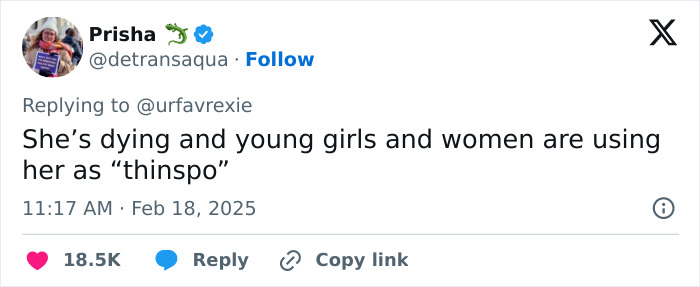
Image credits: detransaqua
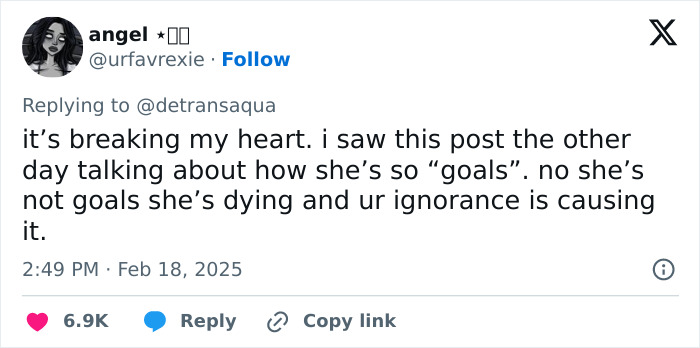
Image credits: urfavrexie
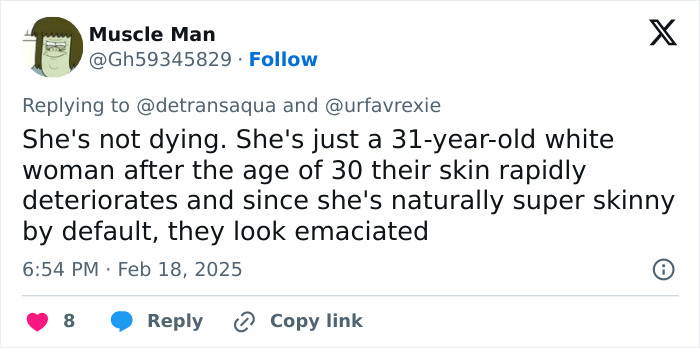
Image credits: Gh59345829

Image credits: MichaelNol90268
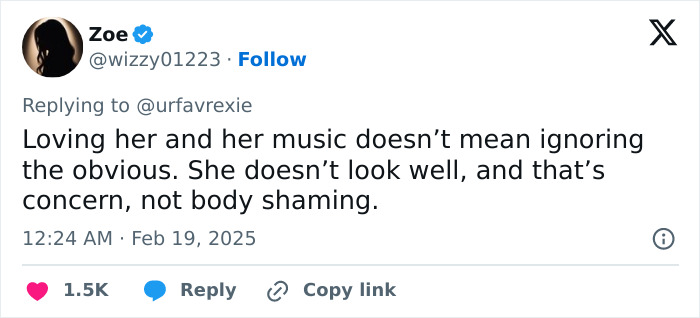
Image credits: wizzy01223
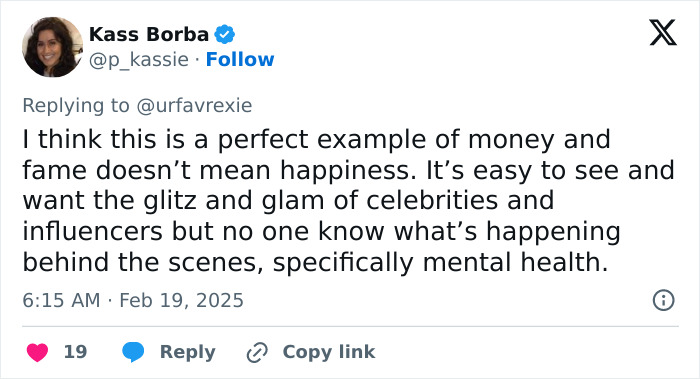
Image credits: p_kassie

Image credits: taraliyah

Image credits: Nljigakulive

Image credits: LilMaccJoey02

Image credits: AmericanSoul834

Image credits: Pastakocken

Image credits: Comptonx187

Image credits: ITISMESB
The post “Not Normal”: Ariana Grande Sparks Concern With BAFTAs Image first appeared on Bored Panda.
from Bored Panda https://ift.tt/K8bQzP6
via IFTTT source site : boredpanda